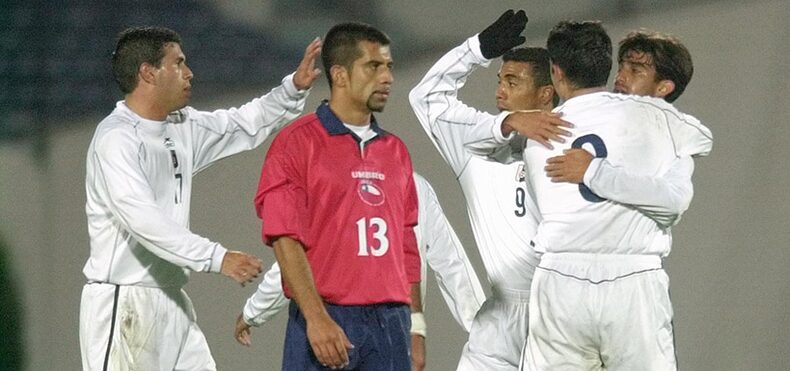September 4, 2001 was one of the dark days of Chilean football. Rodrigo Pérez, one of the players present that day, remembers the details of the defeat against Vinotinto and compares it with the present of the national team.
It was September 4, 2001. La Roja was doing poorly in the Qualifiers, but even the most pessimistic person could not have imagined the prospects. The clock showed 72′ and Chile lost 0-2 against Venezuela at the National Stadium. Sorry image. The Ñuñoa Coliseum was half empty. The hope of going to Korea-Japan had disappeared for some time. At that moment, Rodrigo Pérez entered the field. A perhaps bittersweet memory for the former footballer, who was playing in a qualification for the first time and returning to the national team after several years of absence. A few days earlier, he had had to participate in the friendly match where the Everyone’s Team had fired Iván Zamorano by beating France. Now the blow was violent. Goals from Ricardo Páez (57′) and Juan Arango (62′) led many to describe this fall as the most embarrassing in the history of the national team.
Pérez then played for Cobreloa, a team with which he won three First Division titles. Since that match against Vinotinto, he began to have a permanent position in the Chilean team. He stayed until the end of the road to the 2006 World Cup in Germany. These were not the best years of the national team, but the former player can say that he never took a step aside. And it is not difficult for him to remember those fateful days in Juan Pinto Durán.
For this meeting, Chile trained with Nelson Tapia; Francisco Rojas, Jorge Vargas, Luis Fuentes, Mauricio Aros; Clarence Acuña, Pablo Galdames; Claudio Nuñez, Rodrigo Tello; Cristian Montecinos and Reinaldo Navia.
Do you see any similarities between the Korea-Japan qualifiers and the current qualifiers?
I had to experience this, but I cannot give an opinion on what is happening now.
Would a defeat against Venezuela be a turning point? In 2001, there were several resignations…
These are decisions that haven’t been made, so I don’t want to generate something that becomes a controversy. You had to live it. Now is a key match but beyond that I don’t know if players will be deleted, I don’t really know what could happen in the future. It is true that we all know that this is a vital match, but beyond that, I am not one to talk about someone who is going to make such a decision or to make comments to this subject.

A turbulent period
In March 2001, Pedro García took his place on the bench of La Roja with the mission of turning around and qualifying for the 2002 World Cup. The path was complex, but no one predicted the horrible results of the coach. He left with a total performance of 25.93%. However, during qualifying, this harvest drops to an incredible 2.22%. Remembering those years, Pérez exonerates the coach from a certain responsibility, since what he experienced, as he analyzes it, was the product of a series of shared bad decisions.
How did you end up in the debacle during the match against Venezuela?
Countless situations have occurred. Eventually the coach on duty was Pedro García, but one or two other coaches came by, if I’m not mistaken, and then Jorge Garcés came… I remember we played Iván’s farewell match , Saturday, a match between Chile and France. Then it came down to Tuesday and we lost to Venezuela. So the truth is that it was quite chaotic, because of everything that wasn’t done well. When things aren’t done right, situations like this happen. It’s complex. Then, decisions are made by everyone. Who wants to be there, who doesn’t want to be there. Who exposes himself when things go wrong, but beyond that, everything has been a disaster. This tie was a disaster.
Why is history now about to repeat itself? Who is responsible?
What happens is when things go wrong, coaches and players get blamed. But for the technical teams to arrive, there are people who must give authorization. They must therefore also assume their responsibilities. It’s super easy to say that I provided all the guarantees, all the facilities. As you can see, the responsibilities here belong to everyone. From the management, technical staff and players. It is easy to wash your hands. When things are going well, everyone participates in the process; However, when things go very badly, instead of looking for solutions, people start making excuses and blaming each other. But no, here everyone is responsible, everyone.
Source: Latercera
I’m Scott Moore, a professional writer and journalist based in the US. I’ve been writing for various publications for over 8 years now, and have been working as an author at athletistic for the past five years. My work has been featured by some of the leading sports websites and magazines across Europe.


